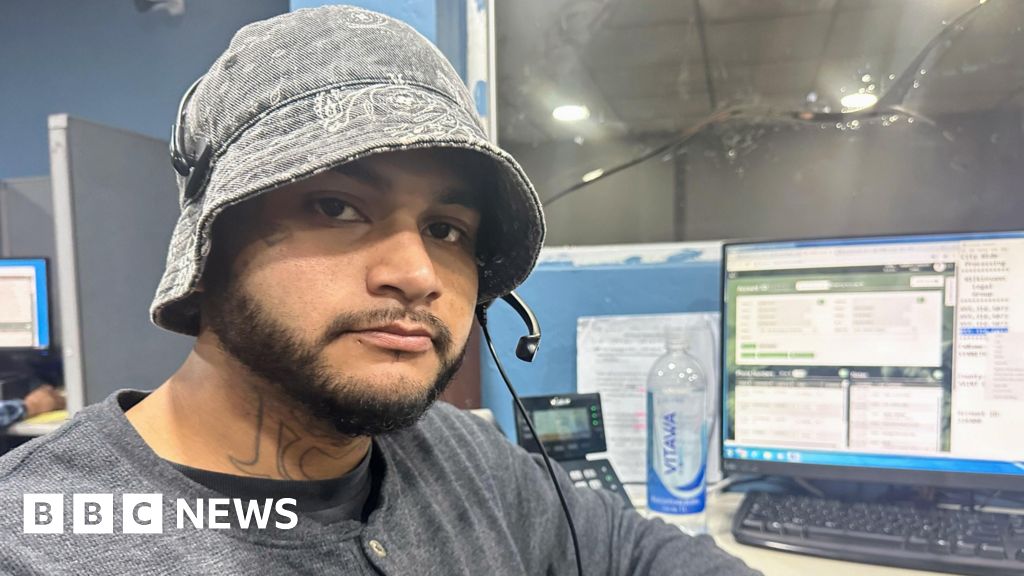When Alberto Salagan was deported from the US in January it was the first time he'd stepped foot in Mexico since he was a baby. Born in the coastal resort of Acapulco, his parents took him to the US when he was just six-months-old. Growing up in California, he was seduced by the false glamour of gang life.
After his arrest in San Diego for gang activity, Alberto was sent back to Mexico just as President Trump was taking office, and found himself homeless and alone in the country of his birth. "It was a shock. It still is," he admits.

"When I got here to Mexico, I really felt lost. No family, no food, no clothes, no nothing." Alberto says he'd almost forgotten how to speak and read Spanish.
"Good thing I didn't lose it completely because it's helped me [to be bilingual]," he reflects. In fact, his language skills saved the 30-year-old from becoming destitute. Through a deportee support organisation, he heard that a local company – EZ Call Center – was looking for English-speakers.
The work, as telephone sales agents, isn't well paid, but employees can earn commissions, and the regular pay cheque gave Alberto the stability he craved. "I had to do something to get back on my feet. Thanks to the call centre, now I have," he tells me during a break between calls.
Almost every agent at EZ Call Center is a deportee, including the company's owner, Daniel Ruiz. He was also born in Mexico and grew up in the US before being deported for low-level drug crime in his early 20s. Daniel says he can relate to his employees' initial sense of disorientation in Mexico.
"We are all dealing with culture shock," he says over a steady hum of telephone calls. "We all have our life over there, went to school over there, were brought up on American culture, have family over there. We're from here but we're from over there too.
" In their booths, the agents work through long lists of US phone numbers, some making promotional calls or sales, others calling about debt collection and refinancing. All the agents speak fluent English, and the clients at the other end of the line are none the wiser that they're talking people in Mexico rather than the US. Daniel says that agents like Alberto – who fell into gangs and crime at a vulnerable age in the US, but are willing to turn over a new leaf in Mexico – are among his most trusted employees.
"They almost never have another mark on their criminal record, and they possess the right discipline to hold down their jobs," he explains. Daniel Ruiz's own experiences after deportation have informed his business decisions. As well as the telesales company, he also co-founded a humanitarian organisation – called the Borderline Crisis Center – which provides deportees with food, shelter and support on their arrival back in Mexico.
After his inauguration, President Trump said he would carry out what he calls "the largest deportation in American history". He has spoken of the removal of millions of undocumented people from US soil, and in the early days of his presidency Immigration and Customs Enforcement (ICE) agents made workplace raids from Chicago to California. Mexican humanitarian organisations, including the Borderline Crisis Center, braced themselves for a huge influx of returnees.
So far, though, one hasn't materialised. There are no major bottlenecks of migrants at the border, and the migrant shelters in Tijuana are not currently overflowing. The latest figures from the Mexican government actually show that the number of deportations from the US to Mexico were lower during the first three months of Trump's second administration than they were for the same period last year.
Mexican President Claudia Sheinbaum said that Mexico received almost 39,000 deportees in February to April, of which 33,000 were Mexican. This compares with 52,000 for the same three months in 2024. However, the fall was in part due to a reduction in the number of people trying to get into the US in the first place.
Migrant "encounters" on the US southern border by US Customs and Border Protection (CBP) agents has dropped to their lowest level in years. The threat of mass deportation combined with other factors – from military deployments at the border, to the high-profile deportations of migrants to El Salvador – may have acted as an effective deterrent. The Trump Administration is also pushing the idea of self-deportation hard to undocumented immigrants through blunt warnings.
Still, there are people being sent back to Tijuana on a near daily basis. Many face hostility as they try to resettle in the dusty and dangerous border city. The few companies which offer deportees gainful employment have become even more important to avoid a slide into criminality.
Beyond a smaller venture like EZ Call Center, a larger company called the American Survey Company or ASC also relies on a deportee workforce. With its sister company, Voxcentrix, ASC has some 550 call centre stations in Tijuana, where agents make calls on everything from election polling to customer satisfaction surveys. "What happened in the US stays in the US," laughs Nora Diaz, ASC's chief happiness officer.
"We don't really do background checks on that." Nora says her job is focussed on the employees' wellbeing, to help them reintegrate. "We understand everyone has a past, and we don't judge based on that.
We don't ask about it during our interview process. We just need people who speak good English and good Spanish and are willing to commit to a job," she explains. The "don't ask, don't tell" policy at ASC was invaluable to Luis Luna's new start.
He grew up in Orange Country in California having been taken to the US when he was just a few months old. "Unfortunately, as a kid, I made some bad choices: joined a gang, ran around with the wrong crowd. Cost me a lot, cost me a life sentence.
I was a lifer in California state prison," Luis explains. While in prison in California, he enrolled for every educational programme available and worked hard on his rehabilitation. On release, he was also sent back to Mexico in January, just as Trump was gearing up for his inaugural speech.
Now 50-years-old and covered in gang-related tattoos, Luis knew he wouldn't get many more second chances in life. "I got no family over here. My family is ASC, the people I met in my employment, they're my family and my friends.
" For Luis, the outwardly dull telephony work has provided the anchor he needs to stay out of crime, something he says ex-gang members he knows in the US struggle with. "From the first day I didn't feel any judgement at all. I felt they just opened their arms and took me in.
I think I'd be in the streets right now if it wasn't for ASC," he adds. While the Trump Administration's mass deportation programme isn't yet at a level many in Mexico expected, some believe it could pick up pace over the coming months. If so, deportees with gang pasts like Alberto and Luis will need some help to start again, irrespective of their crimes.
In Tijuana, many of them will find it at the end of a telephone line..
Business

Deported gang members get second chance at call centre

In the Mexican city of Tijuana a number of firms are employing people who were removed from the US.















